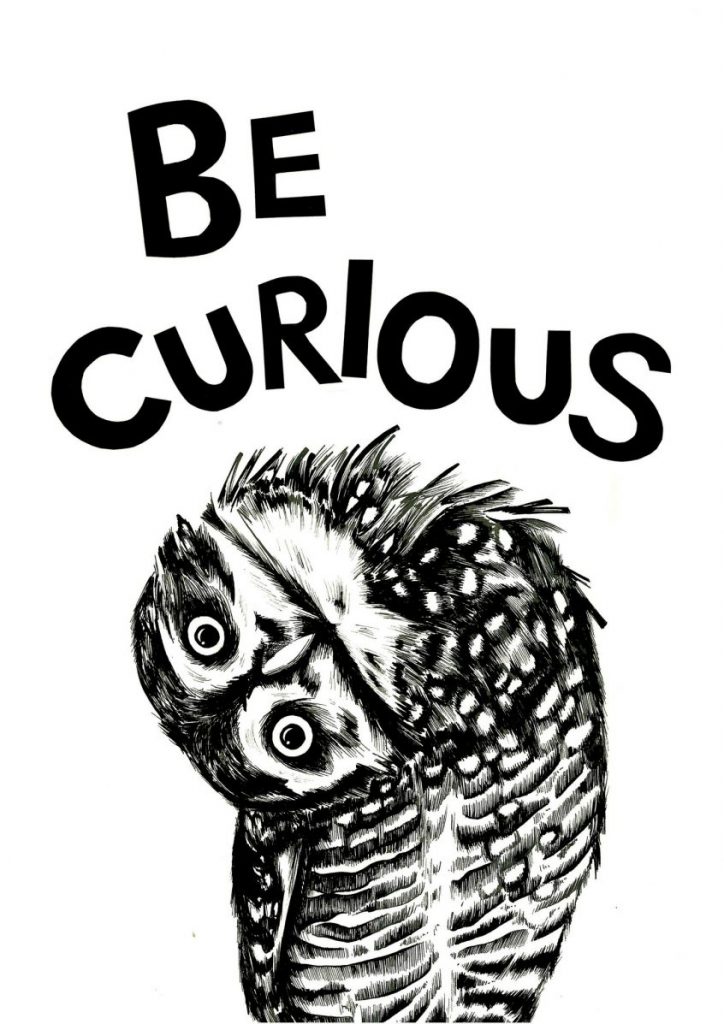You’ll notice that the stories throughout history and since the beginning of time, whether it was the story of Adam and Eve and the apple of knowledge, Icarus and the sun or Pandora’s box, all had the same story which was to do with curiosity.
Back then Christians railed against curiosity claiming that ‘God fashioned hell for the inquisitive’ and that curiosity was greed by a different name. But now we know that curiosity is a vital ingredient for our survival.
Curiosity when we were kids –
Children vibrate with diverse curiosity; it powers their unceasing explorations. In our adult lives it generates a restless desire for new information and new experiences, like refreshing Twitter streams, and seeing the likes on our Facebook page.
Children are creative scientists, experimenting with their physical environments, but they are also investigative reporters, pumping their sources for secrets.
These days it’s easy to fob off kids to our electronic child minders. Technology is a great aid in getting parents off the hook of their children’s curiosity. Switch on the Telly, hand them an iPad, put on a Disney film. It’s not the worst thing you can do to a child. But ignoring your child’s questions may be stunting their innate desire to know and to be more creative later on in life.
Curiosity today –
Schools focus on preparing students for the world of work, rather than on inspiring them, and we end up with uninspired students and mediocre professionals.
Our purely intellectual and creative zeal ebbs as we become adults. A saturation point is soon reached and we settle into an equilibrium and live on what we learned when our interest was fresh and instinctive.
In a world where technology is rapidly replacing humans even in white collar jobs, it’s no longer enough to be merely smart. Computers are smart. But no computer, however sophisticated, can yet be said to be curious.
One of the major concerns is that digital technologies are severing the link between effort and mental exploration. By making it easier for us to find answers, the web threatens habits of deeper enquiry – habits the require patience and focused application.
We live in a culture that is keener on puzzles than mysteries. The web solves the puzzles for us before we’ve had a chance to flex our cognitive muscles. Google, is a great example of a site that can give us the powerful illusion that all questions have definite answers. Google’s aim is to save you from the itch of curiosity altogether.
We’re living in the age of immediacy.
The web is easier to search than ever, but because it meets our desires so efficiently, it doesn’t necessarily stoke our curiosity. Curiosity is sustained by unanswered questions and Google has all the answers; it will never say ‘I don’t know.’
The old media was better at broadening our horizons, our minds. Google can answer anything you want, but it can’t tell you what you ought to be asking.
Machines are for answers; humans are for questions.
How to improve our curiosity –
Mystery is there to allow you to slow down and discover.
We learn better when we find learning difficult. Skills come from struggle.
The new challenge is to find ways of making more people hungry to learn, question and create. It’s not enough just to teach pupils the regular subjects they learn in schools and universities, its the ability to instil a culture of enquiry and critical thinking into the education systems.
Being fully curious is a crucial condition of feeling fulfilled and alive.
There’s also the theory of cheating old age, by spending your time in intellectual pursuits you accrue extra neuronal capacity, buffering them agains the debilitating effects of age.
Curiosity is more of a cognitive activity, deriving from our deep intellectual need to make sense of the world.
The more we know something, the more intense our curiosity is about what we don’t know.
Curiosity therefore rises in tandem with knowledge.
The practice of curiosity is vital to a happy and well lived life.
It’s only through the exercise of our curiosity about others that we can free ourselves from our hard wired self obsession.
Ways to inspire curiosity –
Indulge in an afternoon of entertainment by walking around a bookshop and dipping in to various books as curiosity dictates for you. Read a page or two from various topics as you move from one department to the next.
If you want to know an answer to a question go to a public library instead of using Google.
Next time you walk around your neighbourhood or venture into town make a point of noticing things, contemplating things, arousing your curiosity about your environment. Ask yourself why is a certain thing the way it is and could it be done differently.
When you come across an issue that needs resolving write down 10 ideas or ways of how best to tackle it. Allow your mind to expand by thinking outside the box and seeing what else is possible which you haven’t thought of already.
And finally –
Curiosity is a fragile quality which requires a constant effort to maintain.
Curiosity requires an edge of uncertainty to thrive.
To be a creative artist you have to be willing to live with a sense of uncertainty, to work in the darkness and grope toward an answer, to put up with a certain anxiety about whether there is an answer.
Take for example Steve Jobs, although he wasn’t a particularly original thinker what made him exceptional was his ferocious will to succeed and a burning sense of curiosity. He was interested in everything. He had a very enquiring mind, refused to accept automatically received truths and he wanted to examine everything himself.
The world is an inexhaustibly diverting, inspiring, fascinating place. Take advantage of it.
The future belongs to those who choose curiosity.
Stay curiously hungry, stay curiously foolish.
